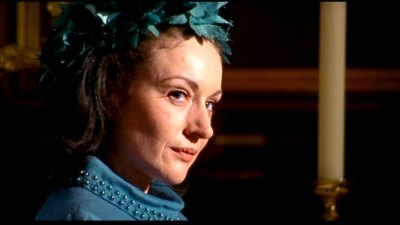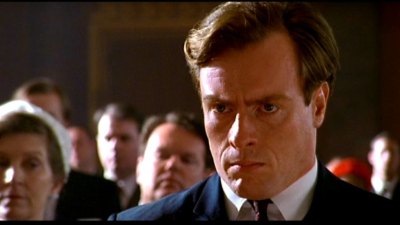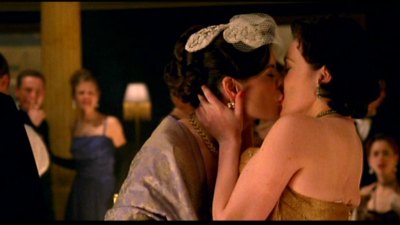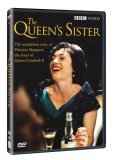| Reviews & Columns |
|
Reviews DVD TV on DVD Blu-ray 4K UHD International DVDs In Theaters Reviews by Studio Video Games Features Collector Series DVDs Easter Egg Database Interviews DVD Talk Radio Feature Articles Columns Anime Talk DVD Savant Horror DVDs The M.O.D. Squad Art House HD Talk Silent DVD
|
DVD Talk Forum |
|
|
| Resources |
|
DVD Price Search Customer Service #'s RCE Info Links |
|
Columns
|
|
|
Queen's Sister, The
Right at the top of the 2005 British made-for-TV movie The Queen's Sister, a bio-pic of Princess Margaret, a title card reads, "Some of the following is based on fact. And some isn't." How refreshing; it's nice to see a docudrama be so forthcoming. Having never read extensively into her life (I know the headlines of her life story), I can't vouch for the truth level of The Queen's Sister. However, what is presented is a remarkably fair and balanced look at the consequences of being a member of the Royal Family. Sympathy is certainly in evidence here for the carefree, intelligent, vivacious sister of Queen Elizabeth, who may have been too smart for the limited public role in which she was "forced" to play. However, the film manages to fairly balance that empathy for its subject with a rather cold, hard look at Margaret's personal failings, including her haughtiness and distance, her choice of comfort and idleness over true love, her courting of public disapproval with her wild social life, and her seeming determination to destroy her own emotional stability by her constant infidelities. At times funny and satirical, at other times raunchy and low down, The Queen's Sister is always fast-moving and involving.

Right out of the gate, the film suggests two momentous events in Margaret's early life helped determine the rocky road in which she would travel until her death. First, the death of her father, King George VI in 1952, ended for Margaret her fairy tale existence as a possible successor to the throne. Largely utilized as a ceremonial figurehead for minor royal functions, Margaret had to face the fact that she would, in all likelihood, never sit on the throne, and that she would always be "second best" in comparison to Elizabeth. Still, Margaret showed her skill in reading the public's tastes as she came to embody the future promise of wealth and good fortune that beckoned to a weary, post-war Great Britain (a promise that went largely unfulfilled for many, in comparison to America's post-war boom). She became the "People's Princess," a convenient wish-fulfilment fantasy figure for a nation that desperately needed some color and glamour in their still-dreary, war-ravaged lives. Free unlike Elizabeth to move around more among the public, and to enjoy a relatively carefree social life that included public displays of wealth and unrestricted social opportunities (a big dream for class-conscious England), Margaret became the ultimate symbol of what many average British citizens wanted so desperately. When it became obvious that Margaret was growing close to Group Captain Peter Townsend, a military hero of the Battle of Britain, the public was entranced with this fairy-tale couple.
However, a second calamitous event in her life - her decision to not marry Group Captain Peter Townsend - seems to have rocked Margaret's personal stability, and set the course for an emotionally tumultuous life filled with disappointment and frustration. The film is very good at giving both sides of the story for the viewer. On the one hand, the filmmakers obviously want to impart the almost sinister nature in which the Royal Family cracked down on Margaret, telling her it was impossible for her to marry an older, divorced man (the Queen is the head of The Church of England, and as such, could not sponsor a marriage of her sister to a divorced man). The filmmakers accomplish this by having that gifted actor, David Threlfall (The Life and Adventures of Nicholas Nickleby) give a chilling, silky performance as Prince Philip, portrayed here as the mouthpiece of the Queen and hatchet man for the Royal Family, who tells Margaret that she will lose everything, including her public stipend and all her possessions, if she marries Townsend. However, no matter what the pressures that were brought to bear on Margaret, the film makes it very clear that ultimately, the decision was hers to make. She could have indeed married Townsend, if she really, truly loved him enough to give up the life she knew. But she simply did not. She ultimately chose comfort and luxury and status over emotional fulfilment (or at least that's what the filmmakers make a case for). According to the film, this decision would permanently cement for Margaret the notion that she was nothing more than a public puppet for the Royal Family, and that she had sold her happiness away rather cheaply.

What follows in The Queen's Sister is a depiction of Margaret as tabloid fodder, jumping from one scandalous incident (kissing the daughter of the U.S. Ambassador in public) to the next (brawling in a pub - sounds suspicious, that). It's almost as if Margaret, resenting the public role she "chose/was forced to choose," decided to give the public what it really wanted - scandal - and in the bargain, self-destruct and punish herself for betraying her own principles and passions in the name of England, duty -- and pounds sterling. After marrying recalcitrant commoner Antony Armstrong-Jones (soon to be made Lord Snowdon), who, according to the film had difficulty subjecting himself to the demands of being a princess' husband, Margaret embarked on a series of ill-advised affairs (to be fair, so did Snowdon) which steadily turned off the British public. As the rise of socialism in Britain increased (as well as the increase in poverty and social unrest), the Royals were increasingly under attack for their profligate spending, all on the public's dime (or shilling, if you will), and for their outdated use as moral role models for their subjects - an increasingly difficult prospect when the Queen's sister was seen frequently as out of control in public. Some of the final images of Margaret in The Queen's Sister are sad, pathetic caricatures of the now much older princess, frolicking with drug addicts and rock stars, trying to escape her stagnant life in the search for mindless sensation.
Propelling The Queen's Sister along at breakneck speed is the lusty, vibrant performance by Lucy Cohu (Gosford Park, Rebecca) as Margaret. Cohu is really quite affecting as the sensual-minded Margaret; she projects a quick wit and a quicker temper, and plays her various nude scenes with enthusiasm. I have no idea if Princess Margaret was anything like Cohu is in the film, but the actress is very good at getting across the simultaneous attractions of imperious haughtiness and flat-out sexual allure that makes The Queen's Sister such a bawdy, raunchy good time. Equally fine is Toby Stephens as Lord Snowdon. Stephens walks a fine line between showing Snowdon as willing accomplice to the Royals' efforts to calm Margaret, and being an active part in Margaret's eventual downward spiral. The two actors work well together, and their performances keep The Queen's Sister on track. Direction by Simon Cellan Jones, with a screenplay by Craig Warner, never lets up on the pace; this 95 minute teleplay moves fast, and is entertaining all the way. Far from being just a stodgy re-telling of a sad life story, The Queen's Sister has a delightfully funny sense of humor, as well (the isolated shots of the public watching Margaret's antics on their tellies is quite good). It's difficult to find a made-for-TV movie such as this, that provides an adult, irreverent, funny look at a serious subject.

The DVD:
The Video:
The widescreen, 1.85:1, enhanced for 16x9 TVs, video image of The Queen's Sister is fairly clear and sharp. I did notice some edge enhancement, as well as some blacks that didn't hold in some of the darker shots, but they were minor and isolated incidents. On the whole, The Queen's Sister is a well-shot, glossy looking film, and the DVD transfer does it justice.
The Audio:
The Dolby Digital 2.0 stereo soundtrack is strong and clear; close captioning is available if the British accents give you some trouble.
The Extras:
Quite unexpectedly, there's a marvelous addition to The Queen's Sister DVD: a bonus feature, A Royal Scandal, from 1996. It stars Richard E. Grant, Susan Lynch, and Michael Kitchen in a fast-paced, very dry and funny take on the disastrous marriage of George, Prince of Wales to Caroline of Brunswick in 1795. At a trim 59 minutes, A Royal Scandal is a pure delight from start to finish, with a subtle, droll narration by Ian Richardson, and charming, light performances by the stars. More attention should have been given to this added feature on the cover of the DVD case; it's quite a nice extra to have here. As well, there's a 14 minute excerpt from a 1960 BBC special on the life of Princess Margaret. It's hard to reconcile these archival images of a sweet, demure, poised princess, with the Margaret you see in The Queen's Sister. The extras for The Queen's Sister are really a treat.
Final Thoughts:
In no way should you fell guilty enjoying the docudrama aspects of The Queen's Sister. The filmmakers are honest enough to step forward immediately and state that the story is a blend of fact and fantasy. So The Queen's Sister can be enjoyed less as a straight biographical journey through the troubled life of Princess Margaret, and more as a jumped up, fast-paced, naughty slice of tabloid trash that at its core, has something very true to say about the Royals, about fame, about wealth, and about what some people will do to escape their personal pain in an effort to find some kind of meaning and purpose in their life. I highly recommend The Queen's Sister.
Paul Mavis is an internationally published film and television historian, a member of the Online Film Critics Society, and the author of The Espionage Filmography.


|
| Popular Reviews |
| Sponsored Links |
|
|
| Sponsored Links |
|
|
| Release List | Reviews | Shop | Newsletter | Forum | DVD Giveaways | Blu-Ray | Advertise |
|
Copyright 2024 DVDTalk.com All Rights Reserved. Legal Info, Privacy Policy, Terms of Use,
Manage Preferences,
Your Privacy Choices | |||||||













